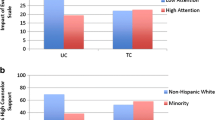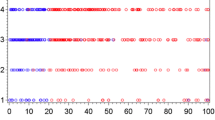Abstract
Telephone disclosure of BRCA1/2 molecular genetic test results has been proposed as a feasible alternative to traditional in-person results disclosure. The purpose of this study was to investigate the relationship between method of result disclosure with the patient outcome variables of knowledge, cancer worry, cancer risk perception, satisfaction, and cancer screening and prophylactic surgery behaviors. Study participants included 228 women who completed retrospective, self-administered, mailed surveys regarding their pre-test genetic counseling and results disclosure. No significant relationships were found between result disclosure method and the outcome variables investigated. A majority (90%) of individuals who received positive results by telephone returned for follow up visits. Factors which genetic counselors believed influenced their clinical decision to offer telephone disclosure, such as history of breast cancer, a priori risk of genetic mutation and family history of known mutation were not shown to significantly impact the actual disclosure method. This study suggests that telephone results disclosure is clinically appropriate when counselors utilize their clinical judgment to determine which patients are appropriate candidates.


Similar content being viewed by others
References
Sakorafas GH, Krespis E, Pavlakis G (2002) Risk estimation for breast cancer development: a clinical perspective. Surg Oncol 10:183–192
Lux M, Fasching P (2006) Hereditary breast and ovarian cancer: review and future perspectives. J Mol Med 84:16–28
American Cancer Society Cancer Facts and Figures (2008) http://www.cancer.org/downloads/STT/2008CAFFfinalsecured.pdf. Cited 15 Apr 2008
Claus E, Schidkraut J, Thompson WD et al (1996) The genetic attributable risk of breast and ovarian cancer. Cancer 77:2318–2324
Lynch H, Silva E, Snyder C et al (2008) Hereditary breast cancer: part I. Diagnosing hereditary breast cancer syndromes. Breast J 14(1):3–13
Hall J, Lee M, Newman B et al (1990) Linkage of early-onset familial breast cancer to chromosome 17q21. Science 250(4988):1684–1689
Wooster R, Neuhausen S, Mangion J et al (1994) Localization of a breast cancer susceptibility gene, BRCA2, to chromosome 13q12–13. Science 265(5181):2088–2090
Lucassen A, Watson E, Harcourt J et al (2001) Guidelines for referral to a regional genetics service: GPs respond by referring more appropriate cases. Fam Pract 18:135–138
Scheuner M, Sieverding P, Shekelle P (2008) Delivery of genomic medicine for common chronic adult diseases. JAMA 299:1320–1334
McBride C, Rimer B (1999) Using the telephone to improve health behavior and health service delivery. Patient Educ Couns 37:3–18
Wilson K, Williams A (2000) Visualism in community nursing: implications for telephone work with service users. Qual Health Res 10:507–520
Wilmoth M, Tulman L, Coleman E et al (2006) Women’s perceptions of the effectiveness of telephone support and education on their adjustment to breast cancer. Oncol Nurs Forum 33:138–144
Donnelly JM, Kornblith AB, Fleishman S et al (2000) A pilot study of interpersonal psychotherapy by telephone with cancer patients and their partners. Psychoncology 9:44–56
Ormond K, Haun C, Duquette D et al (2000) Recommendations for telephone counseling. J Genet Couns 9:63–71
Wang V (2000) What is and is not telephone counseling. J Genet Couns 9:73–82
Helmes AW, Culver JO, Bowen DJ (2006) Results of a randomized study of telephone versus in-person breast cancer risk counseling. Patient Educ Couns 64:96–103
Sangha KK, Dircks A, Langlois S (2003) Assessment of the effectiveness of genetic counseling by telephone compared to a clinic visit. J Genet Couns 12:171–184
American Society of Clinical Oncology (2003) ASCO policy statement update: genetic testing for cancer susceptibility. Am J Clin Oncol 21:2397–2406
Berline L, Fay A (2007) Risk assessment and genetic counseling for hereditary breast and ovarian cancer: recommendations of the National Society of Genetic Counselors. J Genet Couns 16:241–260
Trepanier A, Ahrens M, McKinnon W et al (2004) Genetic cancer risk assessment and counseling: recommendations of the National Society of Genetic Counselors. J Genet Couns 13:83–114
Baumanis L, Evans JP, Callanan N et al (2009) Telephoned BRCA1/2 genetic test results: prevalence, practice and patient satisfaction. J Genet Couns 18:447–463
Klemp J, O’Dea A, Chamberlain C et al (2005) Patient satisfaction of BRCA1/2 genetic testing by women at high risk for breast cancer participating in a prevention trail. Fam Cancer 4:279–284
Chen WY, Barber JE, Higham S et al (2002) BRCA1/2 genetic testing in the community setting. Am J Clin Oncol 20:4485–4492
Jenkins J, Calzone K, Dimond E et al (2007) Randomized comparison of phone versus in-person BRCA1/2 predisposition genetic test result disclosure counseling. Genet Med 9:487–495
Frank T, Deffenaugh A, Reid J et al (1997) Clinical characteristics of individuals with germline mutations in BRCA1 and BRCA2: analysis of 10, 000 individuals. Am J Clin Oncol 70:934–938
Couch F, Blackwood A, Calzone K et al (2002) BRCA1 mutations in women attending clinics that evaluate the risk of breast cancer. N Engl J Med 336:1409–1415
Lerman C, Narod S, Schulman K et al (1996) BRCA1 testing in families with hereditary breast-ovarian cancer. JAMA 275:1885–1892
Claes E, Evers-Kiebooms G, Boogaerts A et al (2003) Communication with close and distant relatives in the context of genetic testing for hereditary breast and ovarian cancer in cancer patients. Am J Med Genet 116A:11–19
Pieterse A, Ausems M, Dulmen A et al (2005) Initial cancer genetic counseling consultation: change in counselee’s cognitions and anxiety, and association with addressing their needs and preferences. Am J Med Genet 137A:27–35
Levy A, Shea J, Williams S et al (2006) Measuring perception of breast cancer risk. Cancer Epidemiol Biomarkers Prev 15:1893–1898
Lerman C, Trock B, Rimer B et al (1991) Psychological side effects of breast cancer screening. Health Psychol 10:259–267
McInerney-Leo A, Hadley D, Kase RG et al (2006) BRCA1/2 testing in hereditary breast and ovarian cancer families III: risk perception and screening. Am J Med Genet 140A:2198–2206
Shiloh S, Avdor O, Goodman R (1990) Satisfaction with genetic counseling: dimensions and measurement. Am J Med Genet 37:522–529
Acknowledgments
We are grateful to the women that participated in this study. We would also like to thank the National Society of Genetic Counselors—Familial Cancer Risk Assessment, Special Interest Group for supporting this research project through an awarded grant.
Author information
Authors and Affiliations
Corresponding author
Rights and permissions
About this article
Cite this article
Doughty Rice, C., Ruschman, J.G., Martin, L.J. et al. Retrospective comparison of patient outcomes after in-person and telephone results disclosure counseling for BRCA1/2 genetic testing. Familial Cancer 9, 203–212 (2010). https://doi.org/10.1007/s10689-009-9303-3
Published:
Issue Date:
DOI: https://doi.org/10.1007/s10689-009-9303-3




